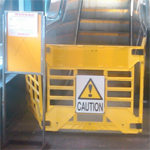Posts Tagged ‘“personal injury”’
Meningitis Outbreak Prompts Federal and State Action on Compounding Pharmacies
A Massachusetts congressmen is proposing legislation that would give the Food and Drug Administration (FDA) greater authority over compounding pharmacies in the wake of a 19-state meningitis outbreak that has killed 29 people.
Rep. Edward Markey, (D., Mass.) last week announced the legislation, which would allow the FDA to inspect and regulate pharmacies partly based on their product volume.
Currently, states hold most of the authority over compounding pharmacies and the FDA is limited to inspections. It cannot require a compounding pharmacy to follow any operating standard.
Markey’s proposal aims to add oversight for compounding pharmacies which produce larger quantities. It does not target the traditional compounding pharmacy, which makes drugs for individual patients with a prescription.
The meningitis outbreak is being blamed on tainted steroid shots made by New England Compounding Center (NECC) of Framingham. As of Nov. 2, 395 people had contracted fungal meningitis, including the 29 deaths. Nine patients have fungal joint infections from steroid injections to the knee, hip, shoulder and elbow.
Officials say the defective drugs were shipped to 23 states and up to 14,000 patients may have been exposed. None of the contaminated product was distributed to Massachusetts healthcare providers or hospitals.
Markey’s proposal follows other attempts for regulation. In 1997, Congress passed a law giving the FDA authority to regulate large compounding pharmacies which advertised their products. But the U.S. Supreme Court struck down the law in 2002.
In Massachusetts, the Board of Registration in Pharmacy also moved to tighten controls last week, unanimously approving rules which allow the state to track drugs made by compounding pharmacies. The state’s goal is to determine whether a compounding pharmacy is violating its license and producing bulk quantities like a manufacturing facility. State officials say NECC was in violation of its license.
NECC has been shut down by the state and all of its products have been recalled. Another compounding pharmacy under the same ownership, Ameridose of Westborough, also recalled all of its drugs last week. On Oct. 10, Ameridose agreed to a temporary shutdown, which has been extended until Nov. 19.
State officials are seeking permanent surrender of NECC’s pharmacy license and permanent license revocation for NECC’s three pharmacists. The state has also started inspecting other compounding pharmacies, one of which has agreed to surrender its license after violations were found.
The Federal Bureau of Investigation (FBI) has launched a criminal investigation and at least three people have also filed personal injury lawsuits, reports USA Today.
Related:
Insight: How compounding pharmacies rallied patients to fight regulation, Reuters.
Harsh punishments rare for drug compounding mistakes, USA Today.
Pharmacy board adopts new rules, The Boston Globe.
Meningitis outbreak nears 400 infected as lawmakers push for tougher regulation, Associated Press/CBS News.
Read More
Infant’s Death Prompts Walmart To Remove Baby Formula
 Walmart pulled Enfamil baby formula from more than 3,000 stores this week after a newborn’s death in Missouri.
Walmart pulled Enfamil baby formula from more than 3,000 stores this week after a newborn’s death in Missouri.
Walmart voluntarily removed the cans of Enfamil Newborn from its store shelves on Monday night. The baby formula is under investigation by health officials after the 10-day-old baby boy’s death Sunday from Cronobacter, a bacteria linked to newborn illness and milk-based powder baby formula. The formula had been used by the baby’s family. A second infant was infected by the bacteria, but recovered.
The 12.5-ounce cans of Enfamil Newborn are marked with the lot number ZPIK7G. This includes at the chain’s 35 stores, 12 super centers and 2 Sam’s Club locations in Massachusetts.
The formula has been sent for testing to the U.S. Centers for Disease Control and Prevention (CDC) and the Food and Drug Administration (FDA). In the meantime, the Missouri Department of Heath and Senior Services is urging consumers who purchased the formula to return it to the store or discard it.
The manufacturer Mead Johnson said that the batch of infant formula used by the child’s family tested negative for Cronobacter when it was produced and packaged.
Mead Johnson and Walmart representatives say the companies are working with authorities. Neither of the companies has implemented a formal product recall. The government has not requested one.
Click here to read a recent news article about this product liability case.
Read More
Snow and Ice Accident Appeal Leads to New Trial in Massachusetts Superior Court
An appeal by a plaintiff in a Massachusetts snow and ice slip-and-fall case has led to the opportunity for trial. The Massachusetts Appeals Court vacated the original judgment and remanded the case for further proceedings after finding that the judge erred in allowing the defendant’s motion for summary judgment.
The case arose from a fall that occurred outside a McDonald’s restaurant in 2007. The plaintiff, Mercilia Lindor, slipped and fell on an icy sidewalk outside the restaurant, breaking her foot. While still lying on the sidewalk, Lindor witnessed another man close by slip and fall to his knees. The conditions were so bad that emergency personnel at the scene had difficulty moving the plaintiff. They had to ask McDonald’s employees to salt the area.
Prior to trial, McDonald’s moved for a summary judgment, arguing that the ice outside the restaurant had accumulated naturally, and that under long-standing Massachusetts common law it was not liable for an accident occurring under those conditions. The plaintiff filed no opposition, and the judge allowed the defendant’s motion, issuing the order on July 22, 2010.
The resulting judgment was entered on the docket on July 28, 2010.
Two days prior to this, however, on July 26, 2010, the Massachusetts Supreme Judicial Court decided the case of Papadopoulos v. Target Corp., in which it established a new standard for determining liability in cases of injury arising from ice and snow accidents: property owners must take “reasonable care” to remove all accumulations of ice and snow. This new standard does not require any distinction between “natural” and “unnatural” accumulations.
The Court also held that the ruling was retroactive, meaning it will be applied to all open and pending claims in which a judgment had not yet been entered. Although the judge issued an order for summary judgment prior to the Papadopoulos ruling, in Massachusetts a judgment is only considered final when a clerk dockets it. Fortunately for the plaintiff, this occurred on July 28, two days after the ruling in Papadopoulos. For this reason, the “reasonable care” standard established in Papadopoulos will apply to Lindor’s case.
The Court decided that there was a genuine issue of fact as to whether McDonald’s took “reasonable care” in protecting lawful visitors to the property, and as a result, the judgment was vacated, enabling Ms. Lindor to pursue her claim.
The case decided was Lindor v. McDonald’s Restaurants of Massachusetts, Inc., Mass. App. Ct No. 10-P-1615 (November 10, 2011).
Read More
Massachusetts Court Rules Against Insurer in Bad Faith Case – Victory for Consumers
The Massachusetts Appeals Court recently ruled that Metropolitan Property and Casualty Insurance Company may have violated state law when it failed to make prompt payments on a no-fault claim. The ruling reversed a trial court decision, and remanded the matter to the trial court for further proceedings on the plaintiff’s claims against the insurance company for bad faith.
Importantly, the court stated that the emotional distress the plaintiff claims she suffered could be considered as part of her damages under the Consumer Protection Act, M.G.L. c. 93A. There is very limited authority in Massachusetts for emotional distress damages in claims under M.G.L. c. 93A.
The facts of the case were straightforward. Ms. Chery was injured in a car accident and obtained medical treatment. Metropolitan was responsible for personal injury protection (PIP) benefits, but failed to pay the bills within thirty days, as required by M.G.L. c. 90, Sec. 34M. The plaintiff filed suit, claiming violations of c. 90, c. 93A, and c. 176D, which governs claims and settlements. The insurance company eventually paid the bills, then claimed it could not be liable for its bad faith claims handling. The District Court judge agreed and plaintiff appealed.
The Appeals Court agreed that the claimant had no further right under the insurance contact itself, as the bills had been paid. However, the court found that there was evidence of bad faith, and the simple payment of the bills did not cure the harm caused by the delay. Among other things, the plaintiff had to file suit, incur litigation expenses, and suffer the unreasonable delay. The plaintiff also claimed that she suffered emotional distress, as her bills were put into collection, and she worried about her credit being affected. The court specifically ruled that the emotional distress damages, even though not readily quantifiable, may be considered compensable under Massachusetts law.
The case was a victory for Massachusetts consumers.
The case is Chery v. Metropolitan Property and Casualty Insurance Company, Massachusetts Appeals Court No. 10-P-103 (June 16, 2011).
We Help Consumers Who Have Been Injured by the Bad Faith of Insurance Companies
Our firm has a long history of helping consumers with claims against Massachusetts insurance companies for bad faith settlement practices. Massachusetts law can be quite favorable for consumers when an insurance company fails to settle a case when liability is reasonably clear. The court may award up to triple damages, depending on the circumstances of the case.
Please feel free to contact us if you have any questions about claims against insurance companies. Our toll free number is 800 379 1244.
Salmonella in Alfalfa Sprouts Prompts Recall in Massachusetts
UPDATE
Jonathan’s Sprouts of Rochester, MA, has widened the recall of its sprout products due to Salmonella contamination. The recall now includes all sell-by dates, including its conventional, organic, and bulk products. The recall includes other sprouts, such as radish, dill, and gourmet mix. Check below for stores where these products were sold. Do not eat them! Return them to the store for a refund.
More information: FDA Recall Press Release.
ORIGINAL POST
The USDA has found Salmonella, a dangerous bacteria related to food poisoning, in Jonathan’s Alfalfa Sprouts products.
 Salmonella, if ingested, can cause serious and sometimes fatal illness and infections in young children, frail or elderly people, and others with weakened immune systems. The symptoms of Salmonella include fever, diarrhea (possibly bloody), nausea, vomiting, and abdominal pain.
Salmonella, if ingested, can cause serious and sometimes fatal illness and infections in young children, frail or elderly people, and others with weakened immune systems. The symptoms of Salmonella include fever, diarrhea (possibly bloody), nausea, vomiting, and abdominal pain.
Jonathans Sprouts has issued an immediate recall of the following effected products:
- Jonathan’s 4oz Alfalfa Sprouts
- Jonathan’s 4oz Alfalfa with Radish Sprouts
- Jonathan’s 4oz Gourmet Sprouts
- Jonathan’s 4oz Alfalfa with Dill Sprouts
- Jonathan’s 8oz Alfalfa Sprouts
Massachusetts Escalator Accident Follows Years of State’s Failure to Inspect
 A recent public records request made by the Boston Globe shows the state has failed to regularly inspect approximately 75 percent of the escalators in Massachusetts malls.
A recent public records request made by the Boston Globe shows the state has failed to regularly inspect approximately 75 percent of the escalators in Massachusetts malls.
From 2008 to 2010, only 44 of the state’s 188 mall escalators received annual inspections as required by law. Inspectors missed one or two inspections during those three years on 144 escalators.
When mall escalators were inspected, they needed repairs in more than half the cases. Mall escalators were shut down 22 times.
The newspaper made the public records request following the wrongful death of 4-year-old Mark DiBona last month in an escalator accident in a Sears department store at the Auburn Mall near Worcester. The child fell through a 6-inch-wide gap between the handrail and the glass barrier.
The state Department of Public Safety suspended the two inspectors who approved the defective escalator for use.
The state’s failure to inspect its escalators dates back at least 15 years. In 1995, the Globe reported that nearly 40 percent of the state’s escalators and elevators had expired inspections.
The state currently has 34,000 elevators and 900 escalators for 51 inspectors to examine. Two dozen of those positions were created in 2010, the same year an audit found that nearly a third of the state’s elevators and escalators had expired inspections. Fifty one inspectors is the most the state has had in years, though some specialists say they still carry a heavy workload.
Beyond staffing, some specialists in the field say that inspectors spend more time on elevators and are less experienced with escalators, which may contribute to escalator accidents in Massachusetts.
Boston personal injury lawyer David White on the findings: “It is encouraging that the state is now catching up on the backlog of inspections. What is discouraging, however, is how many violations they are finding. This is a strong indication that property owners and their own service companies may be putting the public at severe risk.”
To read the Boston Globe article reporting this data, click here.
Read More
Window Blind Design Reconsidered After Numerous Infant Deaths
The Consumer Product Safety Commission (CPSC) has asked manufacturers to re-design window blinds so as to eliminate the risk of infant wrongful death from strangulation.
Window blind manufacturers have known about the problem for decades, starting with a federal study in the 1980s that tied 41 child strangulation deaths to drapery and blind cords. Since then, manufacturers have dragged their feet when it comes to improving safety.
And infants are still dying. The NY Times reports that in August 2009, Kathleen Leeson put her 2-year-old son down for a nap. A short time later, Ms. Leeson discovered her son hanging, lifeless, an inch off the floor with the window blind cord wrapped around his neck. Further, in 2002 1-year-old Cheyenne Kaiser was found by her mother strangled sitting up in her crib, which was next to the window, with the inner window blind cord wrapped around her neck.
The CPSC has released a safety alert for concerned parents explaining the risk of personal injury and wrongful death to children from the various types of window blind cords. In its safety alert, the CPSC makes four recommendations to help prevent these tragic strangulation injuries:
- Use only cordless window blinds in all homes where children live or visit;
- Do not place cribs, beds, or furniture close to windows where children can climb and gain access to the cords;
- Make all loose cords inaccessible; and
- In windows with looped bead chains or nylon cords, use tension devices to keep the cord taut.
Moreover, in response to the industry’s unenthusiastic attempts at improving product safety, a task force of regulators, consumer advocates, and industry leaders have come together to find a solution by the fall of 2011.
The CPSC has also warned the window blind industry that, if it cannot reach a solution soon to minimize these life-threatening dangers, it may face mandatory safety regulations.
Warning to Massachusetts Residents: Tea Light Candles Recalled Due to Holder Burn/Melt Risk
Over 7 million candles have been recalled due to concerns that the cup holding the candles could melt or catch fire.
The Consumer Product Safety Commission has stated that the defective products, tea light type candles, were sold under the brand names Chesapeake Bay Candle and Modern Light.
The affected candles were sold in Massachusetts and nationwide at retailers such as Home Goods, Target, and Wegmans between July 2009 and February 2011.
The clear plastic cup holding the candles is at risk for melting or igniting during use. There has been one consumer report of the candle’s plastic cup melting during use.
Passengers Can Check a Bus Company’s Safety Record
 A series of recent tour bus accidents has raised public concern about which motor coach companies can be trusted on the roadways. Each year, 750 million passengers board motor coach buses in the United States for school trips, recreational excursions and commuting to work. The advantage is the low-cost fare, but many passengers are now worrying about safety.
A series of recent tour bus accidents has raised public concern about which motor coach companies can be trusted on the roadways. Each year, 750 million passengers board motor coach buses in the United States for school trips, recreational excursions and commuting to work. The advantage is the low-cost fare, but many passengers are now worrying about safety.
Dangerous Bus Accidents
On March 12, 15 passengers were killed in a bus crash on Interstate 95 in New York. The bus, operated by World Wide Tours, was transporting a group back from a Connecticut casino. The National Transportation Safety Board (NTSB) is still investigating, but says the driver was speeding.
Two survivors have filed personal injury lawsuits against the bus company, claiming negligence. One lawsuit was filed for $20 million in damages, while the other seeks $200 million.
The fatal bus accident was followed by three other bus accidents resulting in serious personal injuries and wrongful death. Just two days later, a tour bus crashed on the New Jersey Turnpike, killing the driver and one passenger. The Federal Motor Carrier Safety Administration is no longer allowing the company involved, Super Luxury Tours, Inc., to operate.
A week later, a bus carrying Korean tourists from Quebec to Boston crashed in New Hampshire, injuring passengers.
A fatal Massachusetts bus accident occurred over the weekend on Rte. 2 in Shirley when two men tumbled out of a bus window. A 31-year-old man died and a second man suffered serious personal injuries. The bus, owned by Colonial Tours of Boston, had been transporting a group back from touring Red Hook Brewery in New Hampshire.
In January, another bus accident in Connecticut killed a 17-year-old student when it crashed into a guardrail on Interstate 84. The bus had been transporting students to a robotics competition.
The NTSB has launched a six-month investigation into the tour bus industry and may then propose legislation. It plans to look at equipment upgrades and driver training. The NTSB said 60 percent of fatal bus crashes over a 12-year period were caused by driver error.
How Passengers Can Protect Themselves
In the meantime, passengers can protect themselves by researching the bus companies they use for travel. You can search a bus company’s safety rating and accident history on an online database operated by the Federal Motor Carrier Safety Administration.
Click here to access the database. Type in the name of the bus company you are researching.
While there is a lot of important data there, you will find two notable charts at the bottom of the page. The first chart tells you how many bus crashes the company has had in the past two years, including injuries and fatalities. The second chart shows you the Carrier Safety Rating, which will be listed as Satisfactory, Conditional or Unsatisfactory.
Finally, another way to check on a bus company is to use the Internet. Go to the website of the local or city newspaper and search their archives. If there was a major bus accident, you can expect the newspaper reported it.
Read More
Commercial Landlord Liability for Personal Injury Expanded In Massachusetts
By David White


